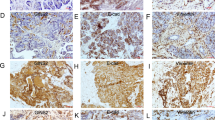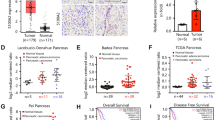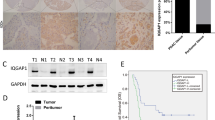Abstract
Deguelin is known to suppress the growth of cancer cells; however, its anti-metastatic effects have not been studied so far in any cancer model. In the present study, we aimed to evaluate the anti-metastatic potential of deguelin in vivo and in tumor growth factor-β1 (TGFβ1)-stimulated cells. Our results demonstrate that tumor growth, peritoneal dissemination and liver/lung metastasis of orthotopically implanted PanC-1-luc cells were significantly reduced in deguelin-treated mice along with the induction of apoptosis. Furthermore, deguelin-treated tumors showed increased epithelial signature such as increased expression of E-Cadherin and cytokeratin-18 and decreased expression of Snail. Similar observations were made when PanC-1, COLO-357 and L3.6pl cells were treated in vitro with deguelin. Moreover, E-cadherin was transcriptionally upregulated and accumulated in the membrane fraction of deguelin-treated cells, as indicated by increased interaction of E-Cadherin with β-catenin. TGFβ1-induced downregulation of E-Cadherin and upregulation of Snail were abrogated by deguelin treatment. In addition, deguelin inhibited TGFβ1-induced Smad3 phosphorylation and Smad4 nuclear translocation in PanC-1 cells. Furthermore, when TGFβ1-induced nuclear factor kappa B (NFκB) activation was inhibited, TGFβ1-induced Snail upregulation or E-Cadherin downregulation was blocked. Deguelin also significantly downregulated the constitutive phosphorylation and DNA binding of NFκB in a dose-dependent manner. Interestingly, overexpression of either NFκB or Snail completely abrogated deguelin-mediated epithelial-to-mesenchymal transition (EMT) inhibition, whereas overexpression of NFκB but not Snail rescued cells from deguelin-induced apoptosis. Hence, deguelin targets NFκB to induce reversal of EMT and apoptosis but downstream effectors might be different for both processes. Taken together, our results suggest that deguelin suppresses both pancreatic tumor growth and metastasis by inducing apoptosis and inhibiting EMT.
This is a preview of subscription content, access via your institution
Access options
Subscribe to this journal
Receive 50 print issues and online access
$259.00 per year
only $5.18 per issue
Buy this article
- Purchase on Springer Link
- Instant access to full article PDF
Prices may be subject to local taxes which are calculated during checkout









Similar content being viewed by others
References
Jemal A, Siegel R, Xu J, Ward E . Cancer statistics, 2010. CA Cancer J Clin 2010; 60: 277–300.
Li D, Xie K, Wolff R, Abbruzzese JL . Pancreatic cancer. Lancet 2004; 363: 1049–1057.
Besmer DM, Curry JM, Roy LD, Tinder TL, Sahraei M, Schettini J et al. Pancreatic ductal adenocarcinoma mice lacking mucin 1 have a profound defect in tumor growth and metastasis. Cancer Res 2011; 71: 4432–4442.
Cates JM, Byrd RH, Fohn LE, Tatsas AD, Washington MK, Black CC . Epithelial-mesenchymal transition markers in pancreatic ductal adenocarcinoma. Pancreas 2009; 38: e1–e6.
Javle MM, Gibbs JF, Iwata KK, Pak Y, Rutledge P, Yu J et al. Epithelial-mesenchymal transition (EMT) and activated extracellular signal-regulated kinase (p-Erk) in surgically resected pancreatic cancer. Ann Surg Oncol 2007; 14: 3527–3533.
Nakajima S, Doi R, Toyoda E, Tsuji S, Wada M, Koizumi M et al. N-cadherin expression and epithelial-mesenchymal transition in pancreatic carcinoma. Clin Cancer Res 2004; 10 (Pt 1): 4125–4133.
Xu J, Lamouille S, Derynck R . TGFbeta-induced epithelial to mesenchymal transition. Cell Res 2009; 19: 156–172.
Gingery A, Bradley EW, Pederson L, Ruan M, Horwood NJ, Oursler MJ . TGF-beta coordinately activates TAK1/MEK/AKT/NFκB and SMAD pathways to promote osteoclast survival. Exp Cell Res 2008; 314: 2725–2738.
Nieto MA . The snail superfamily of zinc-finger transcription factors. Nat Rev Mol Cell Biol 2002; 3: 155–166.
Carver EA, Jiang R, Lan Y, Oram KF, Gridley T . The mouse snail gene encodes a key regulator of the epithelial-mesenchymal transition. Mol Cell Biol 2001; 21: 8184–8188.
Huber MA, Azoitei N, Baumann B, Grunert S, Sommer A, Pehamberger H et al. NF-kappaB is essential for epithelial-mesenchymal transition and metastasis in a model of breast cancer progression. J Clin Invest 2004; 114: 569–581.
Baritaki S, Chapman A, Yeung K, Spandidos DA, Palladino M, Bonavida B . Inhibition of epithelial to mesenchymal transition in metastatic prostate cancer cells by the novel proteasome inhibitor, NPI-0052: pivotal roles of Snail repression and RKIP induction. Oncogene 2009; 28: 3573–3585.
Huber MA, Kraut N, Beug H . Molecular requirements for epithelial-mesenchymal transition during tumor progression. Curr Opin Cell Biol 2005; 17: 548–558.
Lee HY, Oh SH, Woo JK, Kim WY, Van Pelt CS, Price RE et al. Chemopreventive effects of deguelin, a novel Akt inhibitor, on tobacco-induced lung tumorigenesis. J Natl Cancer Inst 2005; 97: 1695–1699.
Murillo G, Salti GI, Kosmeder JW, Pezzuto JM, Mehta RG . Deguelin inhibits the growth of colon cancer cells through the induction of apoptosis and cell cycle arrest. Eur J Cancer 2002; 38: 2446–2454.
Murillo G, Peng X, Torres KE, Mehta RG . Deguelin inhibits growth of breast cancer cells by modulating the expression of key members of the Wnt signaling pathway. Cancer Prev Res (Phila) 2009; 2: 942–950.
Udeani GO, Zhao GM, Shin YG, Kosmeder JW, Beecher CW, Kinghorn AD et al. Pharmacokinetics of deguelin, a cancer chemopreventive agent in rats. Cancer Chemother Pharmacol 2001; 47: 263–268.
Ito S, Oyake T, Murai K, Ishida Y . Deguelin suppresses cell proliferation via the inhibition of survivin expression and STAT3 phosphorylation in HTLV-1-transformed T cells. Leuk Res 2010; 34: 352–357.
Dell'Eva R, Ambrosini C, Minghelli S, Noonan DM, Albini A, Ferrari N . The Akt inhibitor deguelin, is an angiopreventive agent also acting on the NF-kappaB pathway. Carcinogenesis 2007; 28: 404–413.
Lee H, Lee JH, Jung KH, Hong SS . Deguelin promotes apoptosis and inhibits angiogenesis of gastric cancer. Oncol Rep 2010; 24: 957–963.
Chen Y, Wu Q, Cui GH, Chen YQ, Li R . Deguelin blocks cells survival signal pathways and induces apoptosis of HL-60 cells in vitro. Int J Hematol 2009; 89: 618–623.
Wang Z, Li Y, Kong D, Banerjee S, Ahmad A, Azmi AS et al. Acquisition of epithelial-mesenchymal transition phenotype of gemcitabine-resistant pancreatic cancer cells is linked with activation of the notch signaling pathway. Cancer Res 2009; 69: 2400–2407.
Shah AN, Summy JM, Zhang J, Park SI, Parikh NU, Gallick GE . Development and characterization of gemcitabine-resistant pancreatic tumor cells. Ann Surg Oncol 2007; 14: 3629–3637.
Ali S, Ahmad A, Banerjee S, Padhye S, Dominiak K, Schaffert JM et al. Gemcitabine sensitivity can be induced in pancreatic cancer cells through modulation of miR-200 and miR-21 expression by curcumin or its analogue CDF. Cancer Res 2010; 70: 3606–3617.
Zavadil J, Bottinger EP . TGF-beta and epithelial-to-mesenchymal transitions. Oncogene 2005; 24: 5764–5774.
Takekawa M, Tatebayashi K, Itoh F, Adachi M, Imai K, Saito H . Smad-dependent GADD45beta expression mediates delayed activation of p38 MAP kinase by TGF-beta. EMBO J 2002; 21: 6473–6482.
Zhang YE . Non-Smad pathways in TGF-beta signaling. Cell Res 2009; 19: 128–139.
Brinck U, Jacobs S, Neuss M, Tory K, Rath W, Kulle B et al. Diffuse growth pattern affects E-cadherin expression in invasive breast cancer. Anticancer Res 2004; 24: 2237–2242.
Weinel RJ, Neumann K, Kisker O, Rosendahl A . Expression and potential role of E-cadherin in pancreatic carcinoma. Int J Pancreatol 1996; 19: 25–30.
Onder TT, Gupta PB, Mani SA, Yang J, Lander ES, Weinberg RA . Loss of E-cadherin promotes metastasis via multiple downstream transcriptional pathways. Cancer Res 2008; 68: 3645–3654.
von Burstin J, Eser S, Paul MC, Seidler B, Brandl M, Messer M et al. E-cadherin regulates metastasis of pancreatic cancer in vivo and is suppressed by a SNAIL/HDAC1/HDAC2 repressor complex. Gastroenterology 2009; 137: 361–371.
Beavon IR . The E-cadherin-catenin complex in tumour metastasis: structure, function and regulation. Eur J Cancer 2000; 36: 1607–1620.
Salahshor S, Naidoo R, Serra S, Shih W, Tsao MS, Chetty R et al. Frequent accumulation of nuclear E-cadherin and alterations in the Wnt signaling pathway in esophageal squamous cell carcinomas. Mod Pathol 2008; 21: 271–281.
Arsura M, Panta GR, Bilyeu JD, Cavin LG, Sovak MA, Oliver AA et al. Transient activation of NF-kappaB through a TAK1/IKK kinase pathway by TGF-beta1 inhibits AP-1/SMAD signaling and apoptosis: implications in liver tumor formation. Oncogene 2003; 22: 412–425.
Wu K, Bonavida B . The activated NF-kappaB-Snail-RKIP circuitry in cancer regulates both the metastatic cascade and resistance to apoptosis by cytotoxic drugs. Crit Rev Immunol 2009; 29: 241–254.
Tang H, Park S, Sun SC, Trumbly R, Ren G, Tsung E et al. RKIP inhibits NF-kappaB in cancer cells by regulating upstream signaling components of the IkappaB kinase complex. FEBS Lett 2010; 584: 662–668.
Yeung KC, Rose DW, Dhillon AS, Yaros D, Gustafsson M, Chatterjee D et al. Raf kinase inhibitor protein interacts with NF-kappaB-inducing kinase and TAK1 and inhibits NF-kappaB activation. Mol Cell Biol 2001; 21: 7207–7217.
Sahu RP, Srivastava SK . The role of STAT-3 in the induction of apoptosis in pancreatic cancer cells by benzyl isothiocyanate. J Natl Cancer Inst 2009; 101: 176–193.
Pramanik KC, Srivastava SK . Apoptosis signal-regulating kinase 1-thioredoxin complex dissociation by capsaicin causes pancreatic tumor growth suppression by inducing apoptosis. Antioxid Redox Signal (e-pub ahead of print 11 June 2012).
Dupont WD, Plummer WD . Power and sample size calculations. A review and computer program. Control Clin Trials 1990; 11: 116–128.
Oh SH, Woo JK, Yazici YD, Myers JN, Kim WY, Jin Q et al. Structural basis for depletion of heat shock protein 90 client proteins by deguelin. J Natl Cancer Inst 2007; 99: 949–961.
Yan Y, Wang Y, Tan Q, Lubet RA, You M . Efficacy of deguelin and silibinin on benzo(a)pyrene-induced lung tumorigenesis in A/J mice. Neoplasia 2005; 7: 1053–1057.
Kang HW, Kim JM, Cha MY, Jung HC, Song IS, JS Kim . Deguelin an Akt inhibitor, down-regulates NF-κB signaling and induces apoptosis in colon cancer cells and inhibits tumor growth in mice. Dig Dis Sci (e-pub ahead of print 24 May 2012).
Boreddy SR, Pramanik KC, Srivastava SK . Pancreatic tumor suppression by benzyl isothiocyanate is associated with inhibition of PI3K/AKT/FOXO pathway. Clin Cancer Res 2011; 17: 1784–1795.
Boreddy SR, Sahu RP, Srivastava SK . Benzyl Isothiocyanate suppresses pancreatic tumor angiogenesis and invasion by inhibiting HIF-alpha/VEGF/Rho-GTPases: pivotal role of STAT-3. PloS ONE 2011; 6: e25799.
Batra S, Sahu RP, Kandala PK, Srivastava SK . Benzyl isothiocyanate-mediated inhibition of histone deacetylase leads to NF-kappaB turnoff in human pancreatic carcinoma cells. Mol Cancer Ther 2010; 9: 1596–1608.
Kandala PK, Srivastava SK . Diindolylmethane mediated Gli1 suppression induces anoikis in ovarian cancer cells in vitro and blocks tumor formation ability in vivo. J Biol Chem 2012; 287: 28745–28754.
Acknowledgements
We would like to acknowledge National Cancer Institute for supporting the present study in part by R01 grants CA106953 and CA129038 (to SKS). The technical assistance of Kartick C Pramanik, Prabodh K Kandala and Parul Gupta in the in vivo experiment is greatly appreciated. We would also like to thank Dr Thomas L Brown (Wright State University, Dayton, OH, USA), Dr Ming H Wang (Texas Tech Health Sciences Center, Amarillo, TX, USA), Dr Fazlul H Sarkar (Wayne State University, Detroit, MI, USA), Dr Paul Chiao (MD Anderson Cancer Center, Houston, TX, USA), Dr Frank C Marini (MD Anderson Cancer Center, Houston, TX, USA) and Dr Ming-Sound Tsao (University of Toronto, Toronto, Ontario, Canada) for providing the cell lines.
Author information
Authors and Affiliations
Corresponding author
Ethics declarations
Competing interests
The authors declare no conflict of interest.
Rights and permissions
About this article
Cite this article
Boreddy, S., Srivastava, S. Deguelin suppresses pancreatic tumor growth and metastasis by inhibiting epithelial-to-mesenchymal transition in an orthotopic model. Oncogene 32, 3980–3991 (2013). https://doi.org/10.1038/onc.2012.413
Received:
Revised:
Accepted:
Published:
Issue Date:
DOI: https://doi.org/10.1038/onc.2012.413
Keywords
This article is cited by
-
Efficacy and mechanism of action of Deguelin in suppressing metastasis of 4T1 cells
Clinical & Experimental Metastasis (2013)



